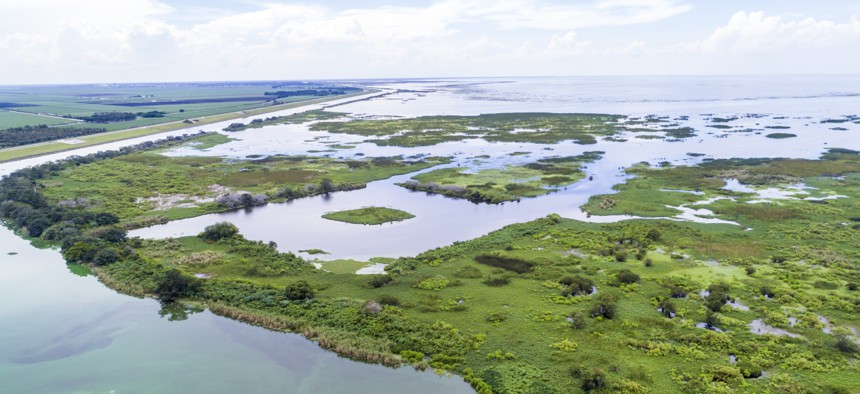Opinion: Are the feds hanging Florida out to dry?
Jeb S. Smith, president of Florida Farm Bureau Federation, writes that the Army Corps of Engineers is doing the 'exact opposite of congressional promises to Floridians' about Lake Okeechobee.

Florida, Clewiston, Lake Okeechobee Waterway aerial. Photo by Jeffrey Greenberg/Universal Images Group via Getty Images
In October, the U.S. Supreme Court heard argument on the Biden administration's latest effort to take control over state waters in Sackett v. EPA. Efforts by the U.S. Army Corps of Engineers in Florida show that the Biden administration has even bigger takeover plans in Florida. The Corps is pushing a water plan in the state that results in a $1 billion fleecing of American taxpayers, tramples the water rights of the state and its citizens, and even manages to disregard the administration's own environmental justice agenda. It is a trifecta of policy failures that should offend conservatives and progressives alike.
Following 2005's Hurricane Katrina, an inspection of the gigantic dike surrounding Lake Okeechobee revealed major problems. The lake is a source of drinking water for many of South Florida’s 7 million people and is used by farmers, tribal nations and the Florida Everglades. In 2008, the Corps reduced the water held in the lake on a three-year basis while it worked on the dike. The Corps told Congress that the cost of the repairs were justified because it would allow the Corps to hold more water in the Lake. Everyone relying on the lake tightened their belts, hoping to avoid damage from any major droughts, believing that any effects would be temporary.
True to form, $1.8 billion and 14 years later, the Corps is nearly done fixing the dike. You might think this would be the promised opportunity to restore water to the lake and address the concerns of the millions who depend on its water. Instead, the Corps is proposing to add almost no water to the lake, wasting the money Congress appropriated for dike repair. Instead, in its recent draft schedule, the Corps is planning to use the lake to address the concerns of U.S. Rep. Brian Mast, who has demanded an end to sending excess lake water to his coastal district.
While the discharges of which Mast complains are an environmental problem, they are simply one of the challenges in restoring the Everglades, for which Congress and Florida have an ongoing plan, known as the Comprehensive Everglades Restoration Plan. As part of getting that plan approved, the residents depending on water from the lake were promised in 2000 that their water supply would not be used to accomplish environmental restoration and that the restoration of the Everglades would come from the new water created by the project's infrastructure.
Fast forward 20 years, and the Corps is now proposing to “restore” the Everglades by keeping the lake lower, holding water that would otherwise go to the coast, and providing water for Everglades restoration by using water otherwise destined for Florida's farmers, cities, tribal nations and lakeside communities. The Corps is doing the exact opposite of Congressional promises to Florida and Floridians in 2000. In essence, through its own rulemaking, it is creating a manmade water shortage putting drinking water, water for farmers, native tribes and the environment at risk.
Lakeside communities are highly dependent on the lake for water supply and jobs; it is these communities that will pay the steepest and most immediate price for the Corps' environmentalism. The Corps’ own documents have stated that these communities "have high social vulnerability because of the large percentage of the population living below the poverty level, housing and transportation concerns (e.g., crowded housing, lack of vehicle access), as well as a large percentage of minorities." Adds the Corps: "Most coastal communities along these counties, however, are wealthy communities." Despite these statements, the Corps devotes only a paragraph to this obvious environmental justice concern in its recent draft Environmental Impact Statement. So much for a commitment to environmental justice that will, in EPA Administrator Regan's words, "outlive all of us."
As if wasting $1 billion in taxpayer dollars and ignoring their own environmental justice agenda weren't enough, the Corps is also managing to wrestle away Florida's traditional control over water. Unlike every previous Corps' schedule for controlling the lake's water level, going back decades, the Corps' new schedule eliminates a role for the state until there's an actual water shortage, when it's too late to avoid dramatic cutbacks. Such a schedule also throws the state’s water permitting regime in South Florida into doubt. And in case it seemed like it couldn't get any worse, the Corps’ draft schedule would cause a long-term violation of the minimum level set by the state for the lake to protect the lake’s own environment. Even on its own terms, the Corps new schedule fails.
One would think that any elected Democrat passionate about environmental justice or any Republican passionate about states' rights in Washington would be offended and conclude the Corps’ plan doesn’t hold water. Instead, it looks like Florida is being hung out to dry.
Jeb S. Smith, a fifth-generation farmer from St. Johns County, is the president of Florida Farm Bureau Federation. Views expressed are those of the author and not of the City & State Florida editorial staff.
NEXT STORY: Opinion: Florida needs further fixes this year for its property insurance problems